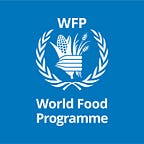“Women, logistics, trucks, warehouses… very cool!”
Meet Theresia Laura — the World Food Programme Indonesia’s logistics superstar.
She has been working with WFP for more than ten years, facing some of the most challenging emergencies, all over Indonesia and even West Africa.
She joined WFP in the aftermath of the historic Aceh tsunami — and she’s been stretching her logistics career ever since. As she moves from post to post in Indonesia, her radiating energy confidently follows.
We spoke to Laura and asked her to share her highs and lows working in the humanitarian field in one of the most disaster-prone areas in the globe.
Hi Laura! How did you start your job at World Food Programme?
In 2005, I was living in Aceh and was working with CARE International, one of WFP’s implementing partners. And all over Aceh, there were a lot of WFP women working in the field. Women, logistics, trucks, warehouses… very cool!
Then one fateful day in 2006, I saw an opening with WFP on Simeulue, an island in Banda Aceh. I took the leap to apply for it, got accepted, and that’s where it all began.
That’s more than ten years ago, could you share where you’ve been posted?
I was in Aceh until the project finished in 2008. In 2009, I re-joined WFP in Mataram, West Nusa Tenggara and got quickly reposted to Padang to take care of the West Sumatra tsunami and earthquake. And in 2010, I was deployed for another emergency in the Mentawai Islands, West Sumatra before settling down at the WFP office in my hometown Kupang, East Nusa Tenggara.
Finally, in 2016, I came to WFP Indonesia’s country office in Jakarta. Most of my roles were in logistics and supply chain, but since WFP Indonesia’s strategy shifted in 2016, we’ve focused on technical assistance and capacity building.
And your current role now is?
Programme Associate for Emergency Preparedness Response. My work at WFP is a combination of providing technical support, report writing, liaising with officials and of course, emergency assistance when needed.
Can you tell me about your most memorable post or mission?
During my 2014 Ebola deployment in Liberia, West Africa, I was Head of the Forward Logistics Base and was in charge of both national and international colleagues in the logistics hub. The role was beyond logistics, as I was dealing with transportation, HR, admin, finance- everything!
It was by far the proudest moment and the highest role I’ve ever encountered. I loved every moment of it — just like any emergency setting, there is so much adrenaline to it and the obstacles faced during tough times made me want to do more and more.
What is it about working in logistics and emergencies that you love?
The results are tangible and seen. We deliver ‘this’ amount of food, manage ‘this’ amount of fleet, partners need ‘this’, and we deliver. It’s a solid result as well as saving lives — that’s why I love it.
Also, emergencies are never dull! We’re always on our toes 24/7, and there’s constantly something to do. I’ve learnt so much while working because these situations require quick response and swift actions.
And what are the challenges about working in emergency response in Indonesia?
The fact that there are no facilities, such as running water for showers, electricity and sometimes a place to sleep. Food is also challenging, but I honestly will eat anything to survive!
Now that you’re working with strategy, not direct assistance are the results still the same satisfaction?
It’s not an immediate result, but it’s progressive. And it’s still challenging in a way as we have to do a lot of planning, implementing and convincing! As long as the end goal of leaving no one behind can is achievable, there is still the same satisfaction.
How is it working in a field that some might say more of a “male-dominated” line of work?
Here at the WFP office, gender is never an issue. We’re all equal! One example is the recent Central Sulawesi tsunami — it was considered a big emergency, but I was sent to the field.
Could you tell me more about the Central Sulawesi emergency? How did it feel being deployed to Central Sulawesi? What was your role?
In late September 2018, a 7.5 magnitude earthquake struck Palu, Central Sulawesi — and was followed shortly by a tsunami with waves up to 6m high. WFP Indonesia was on ground, supporting the Government of Indonesia as well as the humanitarian community.
I was very prepared! As it’s in our job to know and be ready for these situations. I was actually on weekend getaway, but I brought my laptop just in case — and once we received the green light to assist, I flew in straight away.
The initial mission was to conduct a rapid logistics assessment for the Ministry of Social Affairs to identify the capacity, constraints and gaps including infrastructure related to logistics operations (seaport, airport, road access, storage, transport, etc.). Further on, a logistics Concept of Operations (ConOps) was developed, to support logistics operations most efficiently and effectively. Within three months WFP helped more than 50 partners make 1,390 aid deliveries.
Last question, any words of advice to other girls wanting to get into this field?
Go ahead and do it! It’s doable, and the working environment isn’t determined by gender — as long as you perform and have the drive, that’s all that counts.
Written by Nabila Ernada
Read more about WFP’s work in Indonesia.
